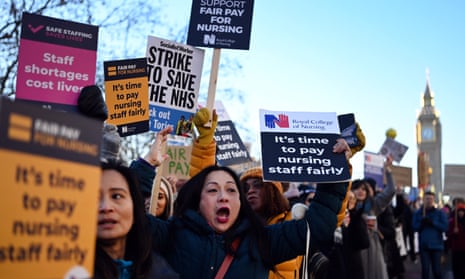Almost 9,000 foreign nurses a year could be leaving the UK to work abroad, amid a sudden surge in nurses quitting the already understaffed NHS for better-paid jobs elsewhere.
The rise in nurses originally from outside the EU moving to take up new posts abroad has prompted concerns that Britain is increasingly becoming “a staging post” in their careers.
The number of UK-registered nurses looking to other countries doubled in just one year between 2021-22 and 2022-23 to a record potential 12,400 and has soared fourfold since before the coronavirus pandemic.
Seven out of 10 of those looking to leave last year – 8,680 – qualified as a nurse somewhere other than the UK or EU, often in India or the Philippines. Many had worked in Britain for up to three years, according to research from the Health Foundation.
The vast majority of those quitting are heading to the US, New Zealand or Australia, where nurses are paid much more than in the UK – sometimes up to almost double.
Experts have voiced their alarm about the findings and said the NHS across the UK, already struggling with about 40,000 vacancies for nurses and hugely reliant on those coming from abroad, is increasingly losing out in the global recruitment race.
“It feels like the NHS is falling down the league table as a destination of choice for overseas nurses,” said Dame Anne Marie Rafferty, a professor of nursing studies at King’s College London.
“Worryingly, it feels as if the UK is perceived not as a high- but middle-income country in pay terms and as a staging post where nurses from overseas can acclimatise to western-type health systems in the search for better pay and conditions.”
Last year, 12,400 nurses working in the UK applied for a certificate of current professional status (CCPS), which they need to have to move to work in another country, the Health Foundation report shows. It is not clear exactly how many of these actually went ahead and left the country.
The largest increase among that group was in overseas-trained nurses who had only worked in the UK for three years or less. That pronounced trend in short stays suggests that for many recruits from abroad “the UK may be a stepping-stone prior to moving to other destinations”, the thinktank said.
It pointed out that OECD data showed that while a nurse in the UK earned on average $46,000 a year (£36,500) – “substantially less than in Australia ($71,000 or £56,350), New Zealand ($57,000 or £45,000) and the US ($84,900 or £67,000)”.
Application for a CCPS to work in America rose tenfold between 2021-22 and 2022-23 after a change in its visa policy meant many more foreign nurses were able to move there.
The Royal College of Nursing said the growing exodus of overseas-trained nurses was due to the significant erosion in pay the nursing profession has suffered since 2010.
Prof Pat Cullen, the RCN’s chief executive and general secretary, said: “It is deeply worrying to see more and more overseas nurses choosing to leave the UK. The recruitment of domestic nurses is collapsing and services are gripped by workforce shortages.
“With patient needs already going unmet, the prospect of losing more of our international colleagues doesn’t bear thinking about.
“The reality is that sustained attacks on pay and poor working conditions are leaving the UK’s healthcare services unable to compete on the world stage. International nurses, like all nurses, have every right to choose to work in countries that better value their skills and expertise. It’s no joke that nurse pay in the UK is joint bottom of 35 OECD countries [as a proportion of the national average wage].”
Report co-author Elaine Kelly, the assistant director at the Health Foundation’s research centre, said that, with an acute nursing shortage and so many overseas nurses quitting the UK, “if the NHS is to avoid becoming a stepping stone to careers elsewhere, it needs to be a more attractive place to work for all nurses, regardless of where they were trained”.
She said the brain drain was especially worrying because it cost the NHS about £10,000 to replace each foreign recruit who then moved elsewhere.
The Department of Health and Social Care said it did not recognise the Health Foundation’s figures. The latest Nursing and Midwifery Council data showed fewer nurses – those trained in the UK and outside it – leaving the NHS, a spokesperson said.
“We hugely value the care provided by our fantastic nurses, which is why we negotiated a fair and reasonable deal with the trade unions delivering a 5% pay rise, two additional one-off bonuses equivalent to 6% of pay and a series of non-pay measures to support the NHS workforce [in England].
“We also delivered on our commitment to recruit an additional 50,000 NHS nurses six months early, and the first ever long-term workforce plan – backed by over £2.4bn of government funding – will provide the biggest training expansion in NHS history, ensuring that up to 130,000 fewer staff, including nurses, will leave the NHS over the next 15 years.”










